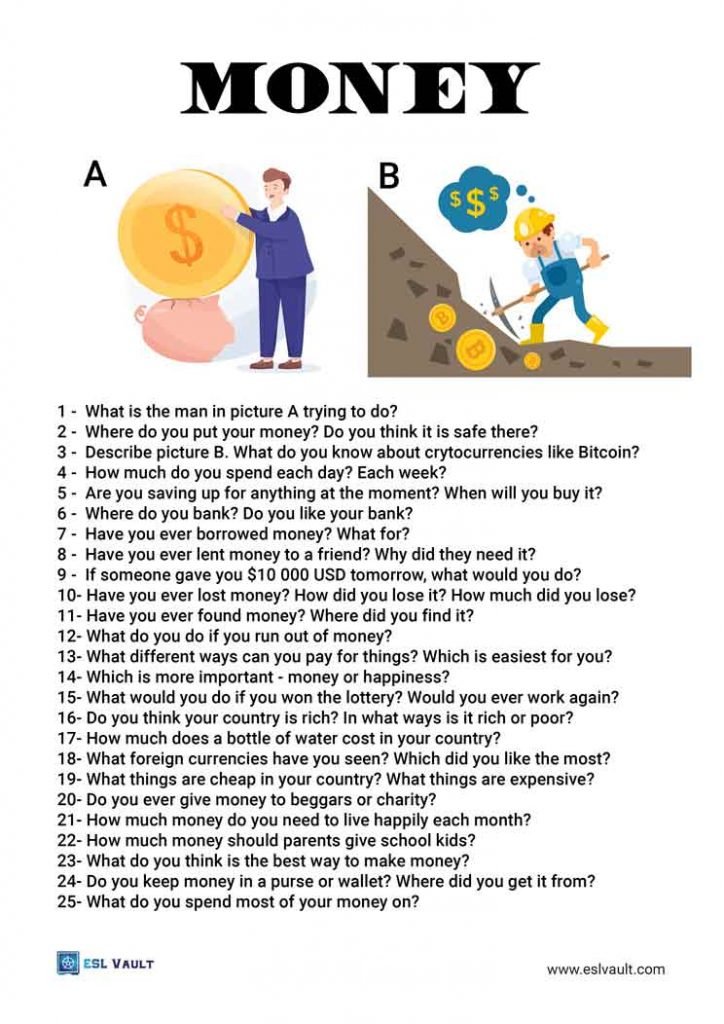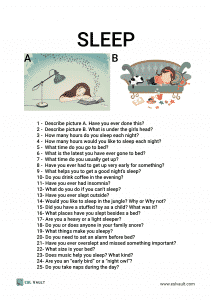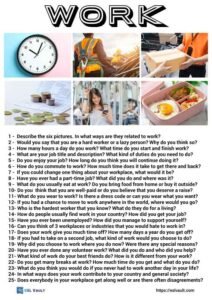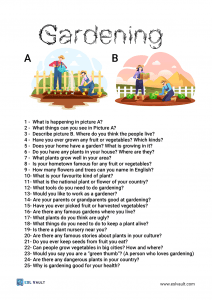Money conversation questions
Updated with 25 new money questions!
50 discussion questions about money. Well, they say “Money makes the world go round” and all students especially older ones will have something to say on the topic.
Challenging vocabulary on this handout includes – beggar, charity, borrow, lottery, currency, purse, and wallet. It is a good idea to make sure your students are familiar with these terms before starting the discussion activity.
The money conversation questions are –
1 – Where do you put your money? Do you think it is safe there?
2 – What do you know about cryptocurrencies like Bitcoin?
3 – How much do you spend each day? Each week?
4 – Are you saving up for anything at the moment? When will you buy it?
5 – Where do you bank? Do you like your bank?
6 – Have you ever borrowed money? What for?
7 – Have you ever lent money to a friend? Why did they need it?
8 – If someone gave you $ 10,000 USD tomorrow, what would you do?
9 – Have you ever lost money? How did you lose it? How much did you lose?
10 – Have you ever found money? Where did you find it?
11 – What do you do if you run out of money?
12 – What different ways can you pay for things? Which is easiest for you?
13 – Which is more important – money or happiness?
14 – What would you do if you won the lottery? Would you ever work again?
15 – Do you think your country is rich? In what ways is it rich or poor?
16 – How much does a bottle of water cost in your country?
17 – What foreign currencies have you seen? Which did you like the most?
18 – What things are cheap in your country? What things are expensive?
19 – Do you ever give money to beggars or charity?
20 – How much money do you need to live happily each month?
21 – How much money should parents give school kids?
22 – What do you think is the best way to make money?
23 – Do you keep money in a purse or wallet? Where did you get it from?
24 – What do you spend most of your money on?
25 – How much money do you usually carry around when you are outside your home?
For some related discussion activities, have a look at the bank conversation questions and the shopping discussion questions.
For further activities, you could add questions about students’ shopping habits or play games like “The Price is Right”. You could also do a quiz on countries and their currencies.
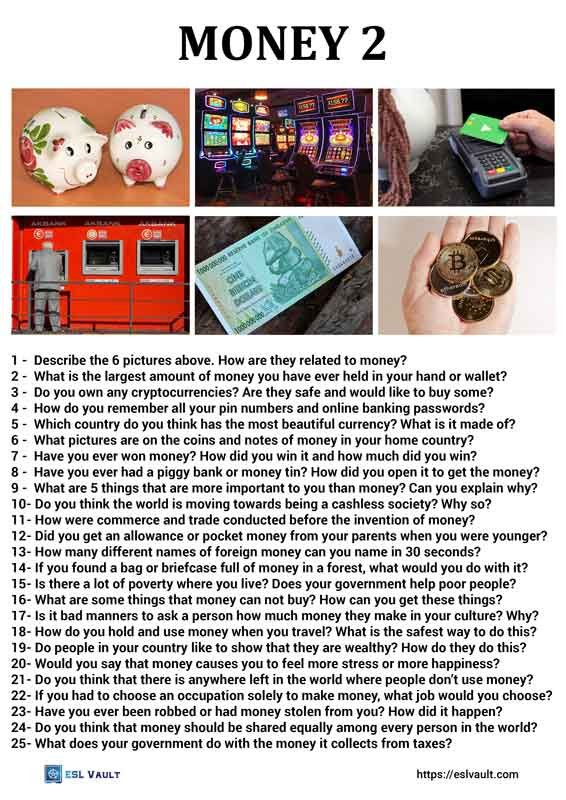
Money conversation questions 2
This second worksheet of money conversation questions is more advanced than the first and has a more complex range of vocabulary.
The hardest words and expressions include – pin number, currency, coin, note, piggy bank, cashless society, commerce, trade, conducted, invention, allowance, pocket money, foreign, briefcase, stress, occupation, shared equally, and taxes.
The money conversation questions in part 2 are –
26 – What is the largest amount of money you have ever held in your hand or wallet?
27 – Do you own any cryptocurrencies? Are they safe and would like to buy some?
28 – How do you remember all your PIN numbers and online banking passwords?
29 – Which country do you think has the most beautiful currency? What is it made of?
30 – What pictures are on the coins and notes of money in your home country?
31 – Have you ever won money? How did you win it and how much did you win?
32 – Have you ever had a piggy bank or money tin? How did you open it to get the money?
33 – What are 5 things that are more important to you than money? Can you explain why?
34 – Do you think the world is moving towards being a cashless society? Why so?
35 – How were commerce and trade conducted before the invention of money?
36 – Did you get an allowance or pocket money from your parents when you were younger?
37 – How many different names of foreign money can you name in 30 seconds?
38 – If you found a bag or briefcase full of money in a forest, what would you do with it?
39 – Is there a lot of poverty where you live? Does your government help poor people?
40 – What are some things that money can not buy? How can you get these things?
41 – Is it bad manners to ask a person how much money they make in your culture? Why?
42 – How do you hold and use money when you travel? What is the safest way to do this?
43 – Do people in your country like to show that they are wealthy? How do they do this?
44 – Would you say that money causes you to feel more stress or more happiness?
45 – Do you think that there is anywhere left in the world where people don’t use money?
46 – If you had to choose an occupation solely to make money, what job would you choose?
47 – Have you ever been robbed or had money stolen from you? How did it happen?
48 – Do you think that money should be shared equally among every person in the world?
49 – What does your government do with the money it collects from taxes?
50 – When did your country last change its currency or make a new note or coin? Why did it do this?
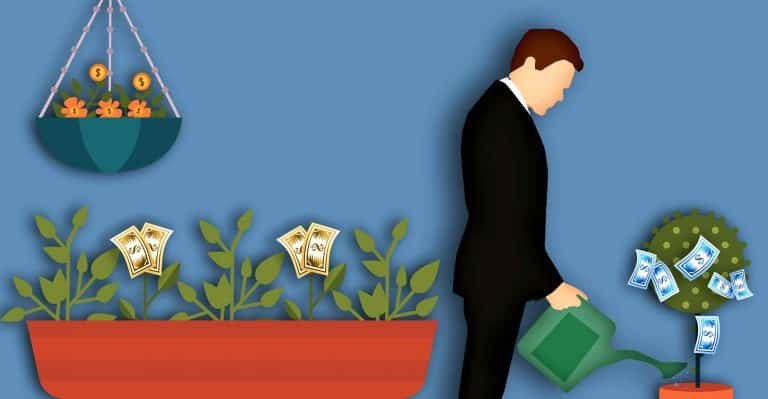
Useful words and phrases for talking about money
To take this lesson further you can teach and try to get students to use these phrases and idioms on the subject of money and finance.
A rip off is something that is overly expensive for its quality.
To afford is to have enough money to pay for something.
To make a killing means to make or earn a lot of money.
Money doesn’t grow on trees – this idiom simply means that money isn’t easy to come by.
The breadwinner is the person who makes the main money for a family or household.
A cheapskate is a person who is overly careful with their money and never likes to spend it.
To be broke or stone-broke is to have no money at all.
To be worth a fortune is to be very very rich.
To cost a fortune is to be very very expensive.

